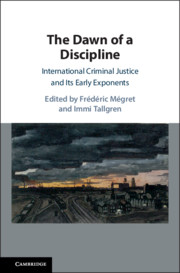Book contents
- Reviews
- The Dawn of a Discipline
- The Dawn of a Discipline
- Copyright page
- Contents
- Contributors
- Foreword
- 1 Introduction
- 2 Hugh H. L. Bellot
- 3 Vespasian V. Pella
- 4 Emil Stanisław Rappaport
- 5 International Criminal Justice as Universal Social Defence
- 6 Henri Donnedieu de Vabres
- 7 Not Just Pure Theory
- 8 Principled Pragmatist?
- 9 Retelling Radha Binod Pal
- 10 Aron Trainin
- 11 The Complex Life of Rafal Lemkin
- 12 Stefan Glaser
- 13 Yokota Kisaburō
- 14 Jean Graven
- 15 Absent or Invisible?
- Index
15 - Absent or Invisible?
‘Women’ Intellectuals and Professionals at the Dawn of a Discipline
Published online by Cambridge University Press: 04 September 2020
- Reviews
- The Dawn of a Discipline
- The Dawn of a Discipline
- Copyright page
- Contents
- Contributors
- Foreword
- 1 Introduction
- 2 Hugh H. L. Bellot
- 3 Vespasian V. Pella
- 4 Emil Stanisław Rappaport
- 5 International Criminal Justice as Universal Social Defence
- 6 Henri Donnedieu de Vabres
- 7 Not Just Pure Theory
- 8 Principled Pragmatist?
- 9 Retelling Radha Binod Pal
- 10 Aron Trainin
- 11 The Complex Life of Rafal Lemkin
- 12 Stefan Glaser
- 13 Yokota Kisaburō
- 14 Jean Graven
- 15 Absent or Invisible?
- Index
Summary
The chapter addresses marginalisation and invisibility based on sex and gender in the histories of international criminal law. Two microhistories are sketched, starring contrasting types of individuals: the first a professional of international law, Katherine B. Fite; the second an intellectual with no legal background, Rebecca West. The chapter discusses ways by which an absence in the collective narratives of a significant past, in this case the ‘intellectual origins of international criminal law’ as an academic discipline and a political cause, can be countered. It reflects on the choices that matter in representing the rare presence against the canvas of an overwhelming absence. It interrogates the problematic aspects of representing individuals as ‘women’, deviant from a normative understanding of an ‘international criminal lawyer’. Analysing representations of Fite and West, it points to frequent tropes in narrating the ‘first and only’. Further, it inquires about the expectations with regard to ‘women’s’ participation and attitudes they may (not) have held towards current feminist causes, and concludes with reflections on why one asks the question on sex and gender of those who figure in our intellectual histories – what figures behind the act of asking.
Keywords
- Type
- Chapter
- Information
- The Dawn of a DisciplineInternational Criminal Justice and Its Early Exponents, pp. 381 - 413Publisher: Cambridge University PressPrint publication year: 2020

